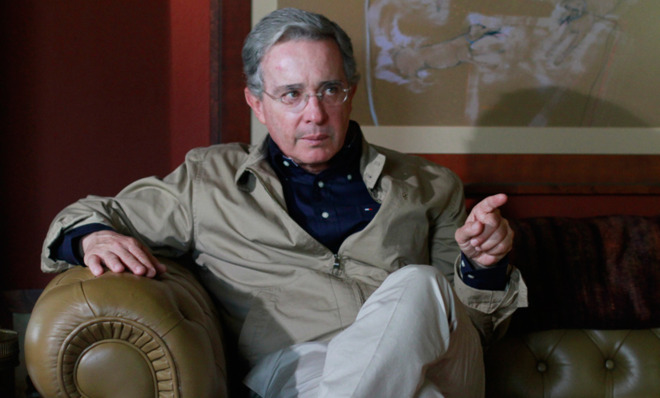Latin America's unwitting peacemaker
Could the antics of a former president bring peace to Colombia?

A free daily email with the biggest news stories of the day – and the best features from TheWeek.com
You are now subscribed
Your newsletter sign-up was successful

Colombia, Washington's closest ally in South America, is on the brink of peace. Again. Or still, it's hard to keep track. Marathon peace talks in Havana have been taking place for well over a year between the hemisphere's most resilient Marxist guerrillas — las Fuerzas Armadas Revolucionarias de Colombia, or FARC — and the government of President Juan Manuel Santos. Providing added drama to the deliberations is the fact that the nation's previous president, Álvaro Uribe, the mentor and former boss of President Santos, is doing his level best to undermine the negotiations, which he considers dangerous and useless.
Colombia has always been a head-scratcher for Americans not steeped in Latin American politics. The country of some 47 million people boasts one of the most vibrant cultures on the continent, with an enviably dynamic civil society, a booming entrepreneurial sector, and an innovative media that sets the benchmark for quality journalism in the region. But the country is also haunted by a horrific legacy of violence, an intractable internal conflict that at the outset looked much like Marxist insurgencies in Central America but ultimately outlived its relevance, and any popular backing it ever had, but managed to endure thanks to its involvement in the profitable drug trade. As recently as 2006, the FARC supplied more than 50 percent of the world's cocaine and reaped $500 million annually from the drug trade.
President Uribe, whose father was killed by FARC rebels, was widely hailed for his unflinching stance against the FARC upon coming into office in 2002. With heavy American support, Uribe's government re-established the authority of the state in vast rural swaths of the country effectively run by the guerrillas. With Santos serving as his defense minister, Uribe united the efforts of the military and civilian agencies. He conducted televised town halls, improved basic services to rural areas, and bolstered Colombia's military capacity to fight the rebels. With significant financial and technological support from the United States, Uribe's offensive decimated the FARC; from a peak of between 16,000 and 20,000, FARC rebels number only around 8,000 today. The success of Uribe's war and the U.S.-backed Plan Colombia (both of which worked better as counter-insurgency than eradication efforts) have become case studies eagerly studied and emulated in other countries, much the way cities were once eager to study and replicate New York's crackdown on crime under Rudy Giuliani.
The Week
Escape your echo chamber. Get the facts behind the news, plus analysis from multiple perspectives.

Sign up for The Week's Free Newsletters
From our morning news briefing to a weekly Good News Newsletter, get the best of The Week delivered directly to your inbox.
From our morning news briefing to a weekly Good News Newsletter, get the best of The Week delivered directly to your inbox.
Constitutionally limited to two terms, Uribe supported Santos for the presidency in 2010, and probably assumed he would still be calling the shots once his underling assumed office. But sensing that the Colombian people were ready for a relaxation of the Uribe-style hawkishness they had welcomed earlier, Santos immediately set a new tone by seeking to mend ties with Uribe's archenemy (and FARC patron) Hugo Chávez, and he eventually agreed to re-enter peace talks with the FARC, a move that turned his former boss into one of the world's angriest Twitter users. On his nicer days, Uribe now denounces his former defense minister as a "scoundrel."
As the hostility intensified, Uribe broke with the Social Party of National Unity and formed a new political party, the Democratic Center. Uribe has announced that he will seek a Senate seat and recruited one-time Senator Oscar Zuluaga to oppose Santos in the upcoming presidential election in May.
Uribe presumably thinks that his fierce denunciations and possible meddling — he has been accused of spying on the negotiations — will doom the chances for peace. But he's probably wrong. Uribe's vocal opposition actually looks to make peace in Colombia more likely.
The peace negotiations that began in November 2012 between the Santos government and the Revolutionary Armed Forces of Colombia (FARC) represented a surprising turn for a half-century civil war that analysts long considered to be a textbook case of intractability. Negotiators have reached agreements on two of five agenda points, but public optimism has faded as the talks dragged on. Still worse, even if negotiators reach an agreement, implementation looms as the biggest hurdle of all.
A free daily email with the biggest news stories of the day – and the best features from TheWeek.com
In other words, the road to peace in Colombia remains riddled with potholes; Uribe's hostility just isn't one of them.
The upcoming elections, and Uribe's desire to make peace talks an issue in them, could paradoxically strengthen Santos' hand at the negotiating table and Columbia's prospects for peace.
Loud clamoring from Uribe and his supporters for a military solution serves as a constant reminder to the FARC, who suffered mightily during Uribe's presidency, that a peace agreement with Santos really is the only game in town. Santos has pinned his re-election hopes to success in peace talks and has astutely refused to suspend negotiations during the election season. Polls currently show him winning on a second ballot but falling far short of a majority, and many voters are still undecided. If FARC negotiators prove overly stubborn or cynical, as they have in the past, peace talks could stall and endanger Santos' re-election bid. With the specter of an Uribe-backed presidency hauntingly clear if negotiations fail, FARC leaders will have greater incentives to reach an agreement. However unwittingly, Uribe has signed up for the role of bad cop in the classic routine, and he is playing his part to perfection.
Adding intrigue to an already cinematic storyline, Colombia's highly-regarded Semana magazine has reported that a Colombian army unit had been spying on the secret negotiations in Havana for over a year. FARC negotiators immediately accused Uribe of being behind the spying. Yet this twist, too, could aid the peace process by offering Santos an opportunity to build trust with the rebels. Deep mistrust pervades both sides and is perhaps the biggest obstacle to reaching a peace agreement. During the last round of peace talks in 1999, FARC rebels exploited the ceasefire to recruit new soldiers, expand drug cultivation, and plan future attacks. This time around, FARC leaders offered a unilateral cease-fire as a goodwill gesture. But with the memory of 1999 still painfully fresh, the government wisely refused to quit fighting while they negotiate. On the other side, FARC rebels also worry about their future vulnerability: Once the rebels disarm and demobilize, the government could renege on its pardons or withdraw support for political and economic reintegration, leaving former FARC members as outcasts.
In such an atmosphere, "confidence-building measures," as conflict managers like to call them, are essential. Santos has seized the spying revelations as an opportunity to demonstrate his sincere commitment to peace. He immediately launched a full investigation and suspended two army generals in charge of intelligence gathering. By holding accountable those responsible, Santos can show that, unlike Uribe, he wants the negotiations to succeed. Opportunities like this spying allegation are invaluable to building the trust with FARC leaders that will be critical to reaching a peace agreement.
Colombia is already, thanks to the government's victories on the battlefield, a great deal more peaceful than it has been in a long time. But a final, lasting peace with justice and a broader healing would provide a huge boost to one of the more promising, if still feeble, democracies in our hemisphere, and an important U.S. ally. The combination of parasitic guerrilla forces and obscenely rich drug cartels over the decades has inflicted a heavy toll on the Colombian people — claiming over 220,000 lives and forcing five million people from their homes — and been a perennial regional flashpoint for tensions, as leftist governments in Venezuela and Ecuador have provided safe haven to the FARC.
A final and lasting peace accord would allow Colombia to focus its energies on solidifying the rule of law and ensuring that the fruits of its economic growth are more widely distributed throughout the country, which suffers from the endemic inequality that is all too familiar throughout Latin America.
A lasting peace would also count as a major success for U.S. foreign policy. So let's hope that former President Uribe's antics, unwittingly or not, help encourage both sides of the negotiation to make a deal, and stick to it.
Sign up to get The Weekly Wonk, New America's digital magazine, delivered to your inbox each Thursday here.
More from The Weekly Wonk...
-
 Political cartoons for February 16
Political cartoons for February 16Cartoons Monday’s political cartoons include President's Day, a valentine from the Epstein files, and more
-
 Regent Hong Kong: a tranquil haven with a prime waterfront spot
Regent Hong Kong: a tranquil haven with a prime waterfront spotThe Week Recommends The trendy hotel recently underwent an extensive two-year revamp
-
 The problem with diagnosing profound autism
The problem with diagnosing profound autismThe Explainer Experts are reconsidering the idea of autism as a spectrum, which could impact diagnoses and policy making for the condition
-
 The billionaires’ wealth tax: a catastrophe for California?
The billionaires’ wealth tax: a catastrophe for California?Talking Point Peter Thiel and Larry Page preparing to change state residency
-
 Bari Weiss’ ‘60 Minutes’ scandal is about more than one report
Bari Weiss’ ‘60 Minutes’ scandal is about more than one reportIN THE SPOTLIGHT By blocking an approved segment on a controversial prison holding US deportees in El Salvador, the editor-in-chief of CBS News has become the main story
-
 Has Zohran Mamdani shown the Democrats how to win again?
Has Zohran Mamdani shown the Democrats how to win again?Today’s Big Question New York City mayoral election touted as victory for left-wing populists but moderate centrist wins elsewhere present more complex path for Democratic Party
-
 Millions turn out for anti-Trump ‘No Kings’ rallies
Millions turn out for anti-Trump ‘No Kings’ ralliesSpeed Read An estimated 7 million people participated, 2 million more than at the first ‘No Kings’ protest in June
-
 Ghislaine Maxwell: angling for a Trump pardon
Ghislaine Maxwell: angling for a Trump pardonTalking Point Convicted sex trafficker's testimony could shed new light on president's links to Jeffrey Epstein
-
 The last words and final moments of 40 presidents
The last words and final moments of 40 presidentsThe Explainer Some are eloquent quotes worthy of the holders of the highest office in the nation, and others... aren't
-
 The JFK files: the truth at last?
The JFK files: the truth at last?In The Spotlight More than 64,000 previously classified documents relating the 1963 assassination of John F. Kennedy have been released by the Trump administration
-
 'Seriously, not literally': how should the world take Donald Trump?
'Seriously, not literally': how should the world take Donald Trump?Today's big question White House rhetoric and reality look likely to become increasingly blurred